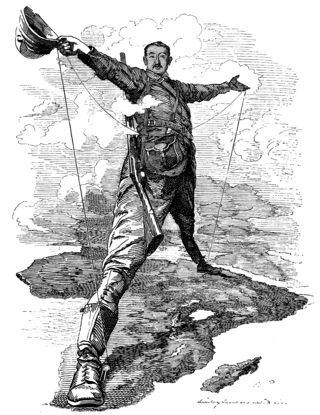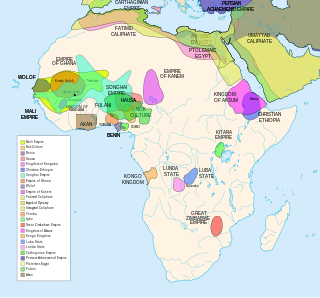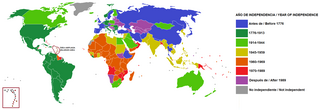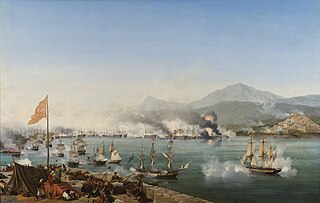
A colony is a territory subject to a form of foreign rule. Though dominated by the foreign colonizers, the rule remains separate to the original country of the colonizers, the metropolitan state, which together have often been organized as colonial empires, particularly with the development of modern imperialism and its colonialism. This coloniality and possibly colonial administrative separation, while often blurred, makes colonies neither annexed or integrated territories nor client states. Colonies contemporarily are identified and organized as not sufficiently self-governed dependent territories. Other past colonies have become either sufficiently incorporated and self-governed, or independent, with some to a varying degree dominated by remaining colonial settler societies or neocolonialism.

Colonialism is the exploitation of people and of resources by a foreign group. Colonizers monopolize political power and hold conquered societies and their people to be inferior to their conquerors in legal, administrative, social, cultural, or biological terms. While frequently advanced as an imperialist regime, colonialism can also take the form of settler colonialism, whereby colonial settlers invade and occupy territory to permanently replace an existing society with that of the colonizers, possibly towards a genocide of native populations.

Imperialism is the maintaining and extending of power over foreign nations, particularly through expansionism, employing both hard power and soft power. Imperialism focuses on establishing or maintaining hegemony and a more or less formal empire. While related to the concept of colonialism, imperialism is a distinct concept that can apply to other forms of expansion and many forms of government.

The influence and imperialism of the West and associated states peaked in Asian territories from the colonial period beginning in the 16th century and substantially reducing with 20th century decolonization. It originated in the 15th-century search for alternative trade routes to the Indian subcontinent and Southeast Asia as a response to Ottoman control of the Silk Road that led directly to the Age of Discovery, and additionally the introduction of early modern warfare into what Europeans first called the East Indies and later the Far East. By the early 16th century, the Age of Sail greatly expanded Western European influence and development of the spice trade under colonialism. European-style colonial empires and imperialism operated in Asia throughout six centuries of colonialism, formally ending with the independence of the Portuguese Empire's last colony Macau in 1999. The empires introduced Western concepts of nation and the multinational state. This article attempts to outline the consequent development of the Western concept of the nation state.

Independence is a condition of a nation, country, or state, in which residents and population, or some portion thereof, exercise self-government, and usually sovereignty, over its territory. The opposite of independence is the status of a dependent territory or colony. The commemoration of the independence day of a country or nation celebrates when a country is free from all forms of colonialism; free to build a country or nation without any interference from other nations.

In historical contexts, New Imperialism characterizes a period of colonial expansion by European powers, the United States, and Japan during the late 19th and early 20th centuries. The period featured an unprecedented pursuit of overseas territorial acquisitions. At the time, states focused on building their empires with new technological advances and developments, expanding their territory through conquest, and exploiting the resources of the subjugated countries. During the era of New Imperialism, the European powers individually conquered almost all of Africa and parts of Asia. The new wave of imperialism reflected ongoing rivalries among the great powers, the economic desire for new resources and markets, and a "civilizing mission" ethos. Many of the colonies established during this era gained independence during the era of decolonization that followed World War II.

The French colonial empire comprised the overseas colonies, protectorates, and mandate territories that came under French rule from the 16th century onward. A distinction is generally made between the "First French colonial empire", that existed until 1814, by which time most of it had been lost or sold, and the "Second French colonial empire", which began with the conquest of Algiers in 1830. On the eve of World War I, France's colonial empire was the second-largest in the world after the British Empire.

The Scramble for Africa was the conquest and colonisation of most of Africa by seven Western European powers driven by the Second Industrial Revolution during the era of "New Imperialism" (1833–1914): Belgium, France, Germany, United Kingdom, Italy, Portugal and Spain.

Decolonization is the undoing of colonialism, the latter being the process whereby imperial nations establish and dominate foreign territories, often overseas. The meanings and applications of the term are disputed. Some scholars of decolonization focus especially on independence movements in the colonies and the collapse of global colonial empires.

Wars of national liberation, also called wars of independence or wars of liberation, are conflicts fought by nations to gain independence. The term is used in conjunction with wars against foreign powers to establish separate sovereign states for the rebelling nationality. From a different point of view, such wars are called insurgencies or rebellions. Guerrilla warfare or asymmetric warfare is often utilized by groups labeled as national liberation movements, often with support from other states. The term "wars of national liberation" is most commonly used for those fought during the decolonization movement. Since these were primarily in the third world, against Western powers and their economic influence, and a major aspect of the Cold War, the phrase has often been applied selectively to criticize the foreign power involved.

The decolonisation of Africa was a series of political developments in Africa that spanned from the mid-1950s to 1975, during the Cold War. Colonial governments gave way to sovereign states in a process often marred by violence, political turmoil, widespread unrest, and organised revolts. Major events in the decolonisation of Africa included the Mau Mau rebellion, the Algerian War, the Congo Crisis, the Angolan War of Independence, the Zanzibar Revolution, and the events leading to the Nigerian Civil War.
This is a non-exhaustive chronology of colonialism-related events, which may reflect political events, cultural events, and important global events that have influenced colonization and decolonization. See also Timeline of imperialism.
The military history of Europe refers to the history of warfare on the European continent. From the beginning of the modern era to the second half of the 20th century, European militaries possessed a significant technological advantage, allowing its states to pursue policies of expansionism and colonization until the Cold War period. European militaries in between the fifteenth century and the modern period were able to conquer or subjugate almost every other nation in the world. Since the end of the Cold War, the European security environment has been characterized by structural dominance of the United States through its NATO commitments to the defense of Europe, as European states have sought to reap the 'peace dividend' occasioned by the end of the Cold War and reduce defense expenditures. European militaries now mostly undertake power projection missions outside the European continent. Recent military conflicts involving European nations include the 2001 War in Afghanistan, the 2003 War in Iraq, the 2011 NATO Campaign in Libya, and various other engagements in the Balkan and on the African continent. After 2014, the Russian annexation of Crimea and the ongoing Russo-Ukrainian War prompted renewed scholarly interest into European military affairs. For further the context see History of Europe.

The historical phenomenon of colonization is one that stretches around the globe and across time. Ancient and medieval colonialism was practiced by the Phoenicians, Greeks, Romans, Turks, Han Chinese, and Arabs.
The military history of Africa is one of the oldest military histories in the world. Africa is a continent of many regions with diverse populations speaking thousands of different languages and practicing an array of cultures and religions. These differences have also been the source of much conflict since a millennia.

When the United Kingdom declared war on Nazi Germany in September 1939 at the start of World War II, it controlled to varying degrees numerous crown colonies, protectorates, and India. It also maintained strong political ties to four of the five independent Dominions—Australia, Canada, South Africa, and New Zealand—as co-members of the British Commonwealth. In 1939 the British Empire and the Commonwealth together comprised a global power, with direct or de facto political and economic control of 25% of the world's population, and of 30% of its land mass.
William Roger Louis CBE FBA, commonly known as Wm. Roger Louis or, informally, Roger Louis, is an American historian and a professor at the University of Texas at Austin. Louis is the editor-in-chief of The Oxford History of the British Empire, a former president of the American Historical Association (AHA), a former chairman of the U.S. Department of State's Historical Advisory Committee, and a founding director of the AHA's National History Center in Washington, D. C.
The decolonisation of Asia was the gradual growth of independence movements in Asia, leading ultimately to the retreat of foreign powers and the creation of several nation-states in the region.

Anti-imperialism in political science and international relations is opposition to imperialism or neocolonialism. Anti-imperialist sentiment typically manifests as a political principle in independence struggles against intervention or influence from a global superpower, as well as in opposition to colonial rule. Anti-imperialism can also arise from a specific economic theory, such as in the Leninist interpretation of imperialism, which is derived from Lenin's 1917 work Imperialism, the Highest Stage of Capitalism. People who categorize themselves as anti-imperialists often state that they are opposed to colonialism, colonial empires, hegemony, imperialism and the territorial expansion of a country beyond its established borders.
This Timeline of European imperialism covers episodes of imperialism outside of Europe by western nations since 1400; for other countries, see Imperialism § Imperialism by country.











